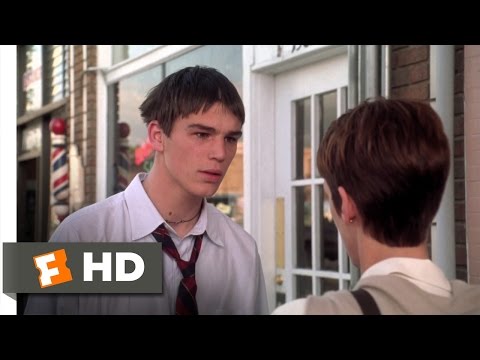Steve Miner’s “Halloween H20: Twenty Years Later” (1998) opens with “Mr. Sandman” by The Chordettes (as did “Halloween II”) and a pumpkin being stabbed with a large kitchen knife.
The filmmakers are telling us, after the murky world-building of “Halloween: The Curse of Michael Myers” (1995), we’re back to John Carpenter’s stripped-down, original vision.
Set on October 29th, 1998, we’re introduced to a charismatic young Joseph Gordon-Levitt (during his “3rd Rock from the Sun” years). An investigation inside a foreboding house leads to the discovery that Michael Myers is alive and still searching for his sister.
It’s a scary, fittingly disturbing start, as we witness how cops are just seconds away from an intervention that could have saved someone’s life.

The effective opening credits (which cleanly lay out the story for newcomers and exhibit John Ottman’s hefty orchestral take on Carpenter’s classic keyboard score) connect us to the legacy of the 1978 original. Yet, Miner’s film was made so long ago, it has a credit that reads, “Introducing Josh Hartnett.”
Jamie Lee Curtis returns as Laurie Strode for the first time since “Halloween II” (1981), in which Michael Myers, her masked serial killer brother, blew up in a hospital hallway and subsequently burned to death after that (he’s famously hard to kill).
Now, Strode is living in Summer Glen, California, under the identity of “Keri Tate,” the headmaster of Hillcrest Academy High School. Her relationship with a colleague, played by Adam Arkin, is certainly passionate but cloaked in deception, as Strode has instructed her son (Hartnett) to keep her real name a secret.
This is the best “Halloween” sequel to date, as it’s as atmospheric and suspenseful as the superior entries, but also really exciting.
Curtis is excellent here. Between this and David Gordon Green’s dramatically strong 2018 “Halloween,” the Oscar winner gave performances worthy of comparison to Sigourney Weaver’s decades-long return to Ellen Ripley in the “Alien” quadrilogy.
The lingering controversy this generated comes from fans unhappy with the mask, which varies in appearance and has disheveled hair (apparently, Myers doesn’t take good care of his William Shatner mask).
NW: #HalloweenH20
(favorite) pic.twitter.com/Y9OuOQhefW
— CriticalOverlord (@CriticalOverlo3) October 19, 2023
The best thing about “Halloween: H20” is that it’s Curtis’ gift to longtime fans seeking closure, narratively and commercially. The worst thing? The film arrived after 1996’s “Scream” and feels slick and safe, with the teen peril as overly familiar as it was a decade earlier.
“Scream” author Kevin Williamson made an uncredited contribution to the screenplay, but his fingerprints are all over this. From the shot of Leavitt cheekily wearing a hockey mask to “Scream 2” playing in a dorm room, the scenes that try the hardest to appeal to the demographic are the ones that are the most dated and predictable.
The grownups are far more fleshed out and interesting than the hickey and flannel-obsessed teens. Aside from the aforementioned scenes that don’t take place at the school, the stalk n’ slash sequences here are generic, until we get to Strode deciding to face her brother.
Like the exhilarating moment in “Aliens” (1986) where Weaver’s Ripley has hit her limit in fear and transforms into a fierce warrior, the Strode vs. Myers portion of this is thrilling and worth waiting for the cliches (dropped keys, a car that won’t start, etc.) to cease.

The teen characters are only interesting because of who is playing them, as budding Hartnett and the eventually brilliant Michelle Williams are joined by “Little Man Tate” star Adam Hann-Byrd and onetime teen star Jodi Lynn O’Keefe.
There’s also LL Cool J, awkwardly included but sticking out in a comic relief role that never really takes (he would be much better utilized the following year in Renny Harlin’s “Deep Blue Sea”).
Arkin works well to bring grounded reality to Curtis’s character – the sad, quiet scene where Strode admits who she really is beautifully written and acted. Gordon Green’s 2018 sequel/reboot dug into Strode’s psychology far deeper, but this wisely portrays her as an alcoholic with PTSD and a focus on work to distract from the boogeyman who may still be out there.
There’s also a small role for Janet Leigh, who is adorable and forceful in the two scenes she shares and steals from Curtis – considering that this was her final film and that she exits to the faint strains of Bernard Hermann’s “Psycho” score on the soundtrack, this is a fine tribute.
In addition to the chilling opener, there’s a terrifying scene in the first act, set in a rest stop. Between this, “Friday the 13th Part 2” (1981) and “House” (1986), Miner (despite not being a showy or nuanced filmmaker) is good at straightforward horror.
RELATED: ‘HALLOWEEN: RESURRECTION’ MARKED FRANCHISE’S LOW POINT
Unfortunately, Miner’s double whammy of a climax (both the violent cat and mouse game and the wild closing moment) would be undermined and retconned by the unwelcome and needless sequel, “Halloween: Resurrection” (2002).
If you pretend that movie doesn’t exist (and for that matter, that only this and Carpenter’s ’78 classic are it for the series), the ending plays even better.
The jaw-dropping final moment of “Halloween: H20” is a perfect, abrupt and entirely satisfying conclusion to both the film and everything that came before it. Greed kept this franchise going but true inspiration and a literal bold swing allowed this series to end on a strong note in ’98 but…evil never dies, so we will be seeing Michael Myers again.
The post ‘Halloween H20: 20 Years Later’ Should Have Ended Franchise for Good appeared first on Hollywood in Toto.
from Movies - Hollywood in Toto https://ift.tt/UknsRHL

No comments:
Post a Comment